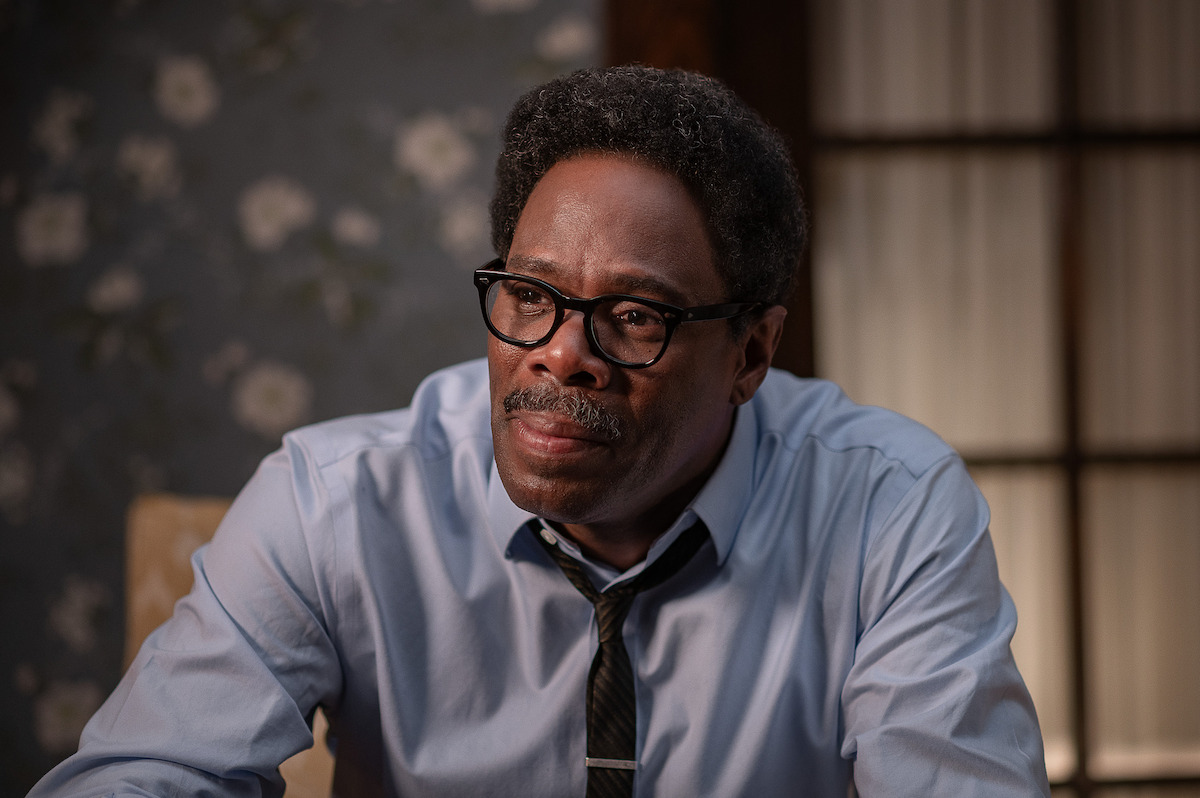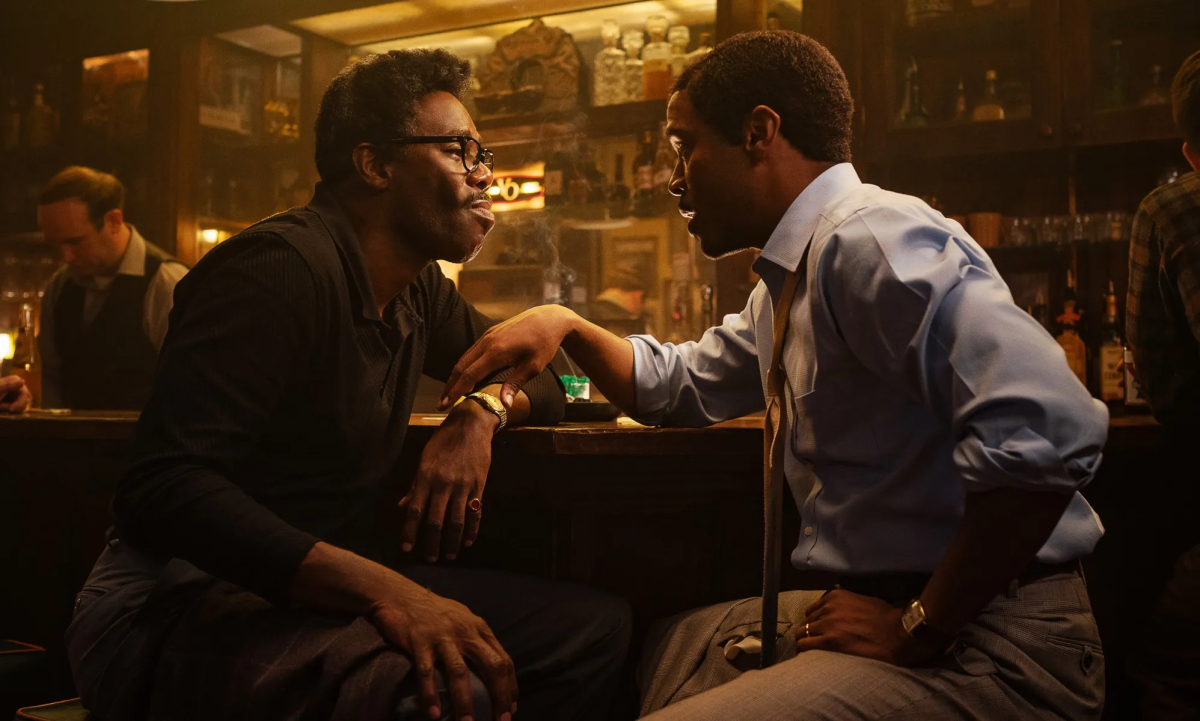I don’t like biopics. Or, at the very least, I approach them all with a heavy, heavy dose of skepticism. I probably should’ve mentioned that to my editor before agreeing to review Netflix’s buzzed about new biopic, Rustin.
That skepticism is well-earned, borne of a Hollywood that has a limited imagination when it comes to stories for underrepresented communities. Though the landscape is changing, for a long time, black biopics and slave narratives became the way for Hollywood tell stories starring black actors. Black biopics were preferred because, as Viola Davis once noted, “it makes the audience feel comfortable that I’m investing in this Black person’s humanity, who I already know has made a mark in the world.” Such is, undoubtedly, the case here, in Rustin when Tony Award-winning director George C. Wolfe shares the story of Bayard Rustin, the unsung hero of the March on Washington.
As a subject, Bayard Rustin presents an additional challenges for the traditional black biopic. The films of this genre are often permeated by an air of respectability and the truth of Rustin’s life can’t exist in that space. He was too complicated, too filled with beautiful contradictions, to be packaged in a tidy box. What’s more, Rustin’s refusal to bend towards respectability in the time period made acknowledging him and his efforts a challenge for others. To tell Rustin’s story truthfully, it’d mean tarnishing the reputations of civil rights leaders that history (and previous biopics) have lionized.
Could a biopic hold space for that level of complexity? I was skeptical… very skeptical.

While at times, Rustin exceeds my expectations, it ultimately falls victim to the trappings of the genre. It limits its view of Rustin (Colman Domingo) to the early 1960s — beginning with the protests at the 1960 political conventions and ending with the March on Washington — robbing audiences of the chance to get to know his full complexity. The job of telling Rustin’s history falls to its dialogue which is full of heavy-handed exposition and turns the story of one of the most charismatic figures of the 20th Century into a slog.
The movie opens with Bayard Rustin (Bayard Rustin) at the Southern Christian Leadership Conference seeking to persuade Dr. Martin Luther King, Jr. (Aml Ameen) to support protests at both the Republican and Democratic conventions. King is weary but with A. Philip Randolph (Glynn Turman) and Ella Baker (Audra McDonald) looking on, Rustin summons him to his better angels.
That Rustin, of all people, has King’s ear annoys prominent members of the movement, namely Roy Wilkins (Chris Rock), the head of the NAACP and Rep. Adam Clayton Powell Jr. (Jeffrey Wright), the Democratic congressman from Harlem. So incensed was Powell that Rustin and King would have the audacity to protest his convention, he called King and threatened to go to the press with the lie that King was having an elicit relationship with Rustin. The notion is so preposterous that Rustin approaches King with a resignation letter in hand. He expects King to denounce Powell’s lies and be prepared to call his bluff. Instead, the young minister accepts his resignation and wishes him well.
To the movie’s credit, it gets the history mostly correct — but so much context is missing. Powell is a virulent homophobe who is only interested in amassing his own power; indeed, pushing King to abandon protests at the Democratic convention earns him a plum chairmanship. But Wilkins’ issues with Rustin are far more complicated. Their disagreement is, partially, a stylistic one — Wilkins preferring the NAACP’s thoughtful legal challenges and lobbying efforts to Rustin’s “rabble rousing” protests — but mostly, Wilkins was protective of the movement. According to Rustin’s own reflections in Time on Two Crosses, Wilkins was a friend. He assured Rustin that he had absolutely no prejudice toward him or toward homosexuality. But Wilkins knew the world — “they are going to raise three questions: the question of homosexuality, the question of draft-dodges, the question of your being a Communist” — and he wanted to keep those questions away from the movement. But because Rustin spends little time highlighting Rustin’s Quaker upbringing or his conscientious objection to World War II or his short affiliation with the Communist Party, Wilkins gets lumped in with Powell in a way that misrepresents the history.
Likewise, Rustin gives King more of a pass than he likely deserved. He gives into political pressure and fires Rustin in 1960 but returns to him three years later to plan the March on Washington. Their on-screen friendship doesn’t miss a beat and the warmth between them is a highlight of the film. But the reality was that Rustin slipped into a deep depression following the split — having lost the standing he’d worked so hard to regain following his arrest in 1953 — and Rustin doesn’t grapple with that at all.
What’s more: Rustin inserts into its frenetic story a romance between Rustin and Elias Taylor (Johnny Ramey), a young pastor who sits on the NAACP board. In front of others, Elias tears down Rustin’s ideas for the March on Washington, but, when they find themselves alone together, he admits his admiration for the older organizer. Rustin clocks Elias’ interest and dares him to say it out loud for himself. Instead, the young pastor briefly steps into Rustin’s space and admits that his wife (Adrienne Warren) will soon be leaving town. Later they tumble into a bar and then into each other, beginning an affair. It lasts until Elias is spooked by a police raid at the aforementioned bar and he’s called back down South to take over his father-in-law’s pulpit.
It is, at once, the movie’s most prolonged engagement with Rustin’s sexuality — and thus, something I very much wanted to see in this movie — while also being both poorly written and unnecessary. Rustin fawns over Elias but later asserts that his commitment to the movement comes first. But what’s more notable: Elias Taylor did not actually exist; he is fictionalized for the purposes of this film. It’s a curious addition, particularly when Rustin and his assistant, Tom Kahn (Gus Halper), had an actual years-long relationship that could’ve been woven into the narrative instead. Why insert this fictional closeted black man into the narrative? It’s perplexing.

If there is an upside to Hollywood’s fascination with black biopics, it’s that it might finally afford Colman Domingo the recognition that he deserves. Bayard Rustin was a part Colman Domingo was destined to play — he brings life to an, at times, lifeless script. If there is a reason to see Rustin, it is him. He exudes all the charisma and charm that drew people to Rustin like a magnet.
I continue to enjoy this career renaissance for Glynn Turman, who delivers a powerful performance as A. Philip Randolph. Though Rustin’s friendship with King takes center stage here for obvious reasons, it is the friendship between Randolph and Rustin that intrigues me the most. Even as others abandoned him, Randolph remained fiercely loyal.
On paper, Rustin had the potential to be something great: a compelling protagonist with a rich, complicated, and unexplored history, a gifted writing team, a stellar cast, an award winning director and the backing of Netflix and Higher Ground, the Obamas’ production company. But Rustin lacks the boldness of the man it seeks to portray. Rustin’s character is flattened and constrained by the genre. The result is a serviceable film but wholly incomplete.
Once upon a time, I would’ve said that Rustin will, at least, make good fodder for a high school class during Black History Month. But between today’s political climate, the movie’s fictionalized romance, and the allusions to oral sex (as pretext for his 1953 arrest), that feels like wishful thinking. Without that possibility, I find myself yearning for a film that was bold in its writing and direction rather than one that strives for a mass appeal it may not even attain.
The world does not benefit from these sanitized tales of our heroes.
Rustin is now streaming on Netflix.



Oof. So good.
“I find myself yearning for a film that was bold in its writing and direction rather than one that strives for a mass appeal it may not even attain.
The world does not benefit from these sanitized tales of our heroes.”
Thanks for this review! Rustin was such an interesting and complex man; it’s hard to hear that his life was under-served by this film.
awesome review!!!! I know a little about Rustin, but would love to learn more. I don’t suppose you (or anyone else who happens to read this) have any recs for (auto?)biographical books/videos/etc that do him justice?
Thanks so much, @jaimessss. I do have a few other recommendations: Brother Outsider: The Life of Bayard Rustin is a great documentary that’s worth checking out. Bayard’s partner, Walter, also participated a short documentary called, Bayard & Me which gives a brief examination of their life together.
John D’Emilio’s biography, Lost Prophet, is probably my favorite book on Rustin but I’d also recommend books featuring Rustin’s own thoughts: I Must Resist: Bayard Rustin’s Life in Letters and Time on Two Crosses: The Collected Writings of Bayard Rustin.
Natalie I loved this review. I share a lot of these same criticisms, even if for me Colman’s performance and George C. Wolf’s directing choices (I’ve seen others complain of his theatricality, but as a former theatre kid they speak to me) overpowered what was otherwise lacking. I loved it, but I also love reading smart takes about why people should take it with heavy handfuls of a salt. Both are true.
Thank you for this!!
When playing geometry dash meltdown, pay attention to the icons and signs along the way. They often indicate what’s coming next!